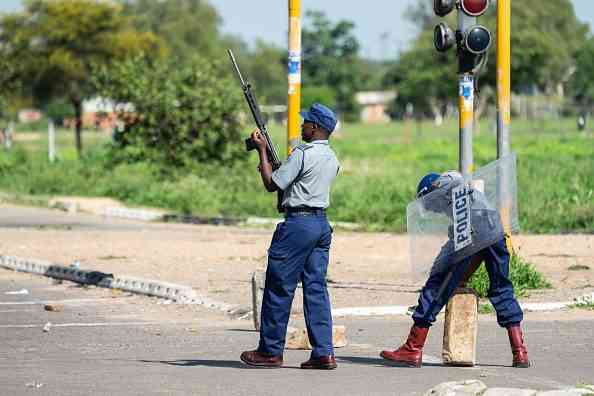
British tycoon, Nicholas van Hoogstraten has lost a High Court application in which he sought to force the Sheriff to transfer a property in a Harare posh suburb to his name.
In his application, van Hoogstraten cited Felistas Runyararo James, the Sheriff and the Registrar of Deeds as respondents.
The British tycoon sought an order compelling the transfer of the immovable property, namely Stand No 4 Wroxham Road, The Grange in Harare, to him and the ejectment of James from the same.
James is the judgment debtor in the original matter and was the former registered owner of the property.
The Sheriff of the High Court was cited in her official capacity as the officer who conducted the sale in execution of the property.
The Registrar of Deeds was cited in his official capacity due to the transfer of real rights.
James opposed the application on the ground that the application was fatally defective for non-compliance with Practice Direction 1 of 2022.
She submitted that once the summons lapses, it cannot be revived, hence the tycoon’s application is null and void.
- Fresh land invasions hit Whitecliff
- Pomona cash row escalates
- Border Timbers targets European markets
- SA name strong A side for Zim tour
Keep Reading
James argued that the unexplained delay of approximately 14 to 16 years in prosecuting the claim was inordinate and incapable of enforcement since the property was sold and transferred to a third party back in 2013.
Van Hoogstraten maintained that he had a reasonable explanation for the delay, largely blaming administrative hurdles in retrieving a dormant court record.
He argued that the 2005 sale in execution gave him indefeasible rights to the property, which ought to be enforced to prevent a travesty of justice.
According to court papers, sometime in 2005, James’s property was sold in execution to satisfy a judgment debt.
Van Hoogstraten emerged as the highest bidder at the public auction and the sale was duly confirmed by the Sheriff.
The tycoon acquired vested rights to the property that ordinarily cannot be interfered with by the judgment debtor or even the Sheriff or judgment creditor.
James then engaged in various legal manoeuvres to challenge and delay the transfer of the property.
She initially filed court proceedings (HC 5655/05 and an appeal SC 145/06) contesting the confirmation of the sale without success.
The High Court and Supreme Court dismissed her appeal, upholding the validity of the sale in execution.
Court records indicate that she allegedly resorted to extrajudicial means to retain the property.
James and the Sheriff then allegedly engaged in an irregular “arrangement”.
She tendered payment of the judgment debt in full, but only after the sale had been confirmed.
An official in the Sheriff’s office then purported to return Van Hoogstraten’s cheque around 2006 to 2008, as if to cancel the sale.
The judgment creditor argued that his cheque was never dishonoured by the bank, but was allegedly unilaterally returned to him by the Sheriff’s office official.
High Court judge Justice Joel Mambara said the judgment creditor’s last-minute acceptance of the debtor’s payment created confusion.
Van Hoogstraten characterised this sequence as a collusive “scheme” between the judgment debtor and judgment creditor, with the alleged complicity of the Sheriff’s office to deprive him of the property.
James allegedly proceeded to transfer title of the property to a third party, the Richard Samaita Family Trust, in 2013.
James eventually vacated the property, acknowledging that she no longer had any interest in it and the trust took possession.
However, van Hoogstraten did not challenge the transfer to the trust at the time and no legal action was instituted in 2013 to interdict or reverse the transfer.
Van Hoogstraten instead pinned his hopes on the lawsuit he had filed back in 2009 (HC 2047/09), wherein he sought an order compelling the transfer of the property to his name.
This was either by James signing over the title or, failing that, the Sheriff or Registrar of Deeds being ordered to effect transfer and an order evicting James and anyone claiming occupation.
From 2009 onwards, that civil action lay dormant and Van Hoogstraten applied for summary judgment under case HC 2560/09.
He lost the appeal.
On March 24, 2022, Practice Direction 1 of 2022, which provides that if no significant steps have been taken in a civil action for two years, the summons is deemed to have lapsed, came into force.
By operation of that directives, van Hoogstraten’s 2009 summons was deemed abandoned and lapsed at the latest by March 2024.
Van Hoogstraten argued that he wrote to the Registrar in November 2021, before the practice direction, requesting the court file to be located and uplifted from the archives.
Van Hoogstraten then moved with haste to file the present chamber application on April 30, 2025.
In his ruling, Justice Mambara said Practice Direction 1 of 2022 was binding.
“The applicant did not avail himself of the remedy provided in that practice direction seeking an extension within the prescribed time,” the judge ruled.
"By the clear terms of the practice direction, his summons lapsed and ceased to have any force in this court’s file as of the deadline.
“What the applicant is truly asking is for the court to exercise extraordinary indulgence to overlook the lapse.”
The judge said van Hoogstraten failed to show good cause for condonation and reinstatement.
“While he asserts a morally and legally sympathetic claim, the delay is egregious and only partially explained, and the prospects of success in obtaining meaningful relief are weak because the case is largely moot and fraught with procedural and substantive hurdles, including potential prescription,” the ruling read.
"The interests of justice do not favour reviving this litigation at this late hour. On balance, justice demands that this matter be laid to rest rather than reopened.
“The applicant’s own inaction, however justified he feels it was, has contributed to the complexity and futility that now attend the case.
“There comes a point when even a meritorious claim must yield to the greater good of certainty and finality. That point, in this court’s view, has long passed in this case."
The Judge dismissed the businessman’s application with costs.
"The applicant has failed to surmount the procedural and substantive hurdles to the relief he seeks.
The applicant’s plea for condonation falls short of the strict standards set by the law for granting such an indulgence,” the judge said.
“Furthermore, the relief sought has been overtaken by events and would amount to a brutum fulmen.
“In the result, it is ordered that the chamber application for condonation, extension of time and reinstatement of summons is dismissed with costs on the legal practitioner-client scale.”










